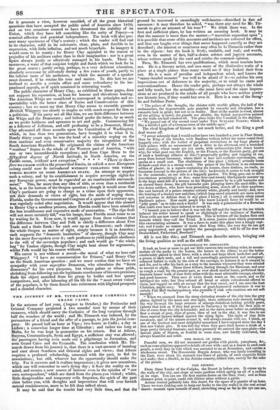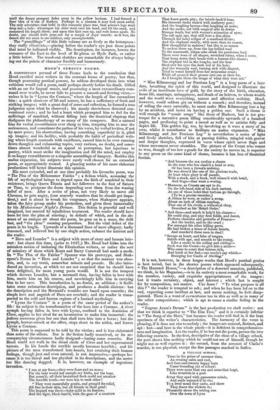THE JOURNEY OT MR. TITMAR SR FROM CORNHILL TO GRAND
CAIRO.
IN the autumn of last year, (August to October,) the Peninsular and Oriental Company projected a two months' tour by means of their steamers, which should carry the Cocknies of the long vacation through half the wonders of the world ; and Mr. Titmarsh was induced, by the persuasions of a friend and the offer of a passage, to join the jovial com- pany. He passed half an hour at Vigo ; two hours at Cadiz ; a day at Lisbon; a somewhat longer time at Gibraltar ; and rather too long at Malta, for he was kept in quarantine on his return. But at Athens, Smyrna, Constantinople, Syria and Egypt, a sufficient stay was allowed ; the passengers having even made out a pilgrimage to Jerusalem, and seen Grand Cairo and the Pyramids. The conclusion which Mr. Tit- marsh draws from his journey is, that there is a vast amount of humbug and cant about Southern and Oriental sights and views ; that Athens requires a profound scholarship, saturated with the past, to feel its associations ; but still, whoever has the opportunity should make the trip. For it corrects and it realizes impressions ; it gives new sensations, which one will remember to one's dying day; it fixes the reality on the mind, and creates a new source of interest even in the epistles of "our own correspondent," which are dated from the places you visited ; little disagreeables and temporary evils forgotten, the spirit of the past rises before you, with thoughts and impressions that will ever furnish mental reminiscences, more to be felt than talked about.
It may be said that the tourist had very little time, and that the ground he traversed is exceedingly well-beaten—described in fact ad nauseam: it may therefore be asked, " was there any need for Mr. Tit- marsh to give an account of his tour ?" We think there was. In the first and sufficient place, he has written an amusing book. It may be that the manner is more than the matter—" materiem superabat opus " ; it is possible that some of his accounts and incidents are coloured for effect, and that one laughs over things that never happened exactly as they are described ; the interest or smartness may often be in Titmarsh rather than in the objects : but the book is lively, readable, and real ; and worth, even in its matter of fact, half-a-dozen solemn and jogtrot accounts, whose writers speak by the card and reiicho the common opinion.
Then, Mr. Titmarsh has two qualifications, which most tourists have not. He is a literary artist, and sees more of the distinctive traits of a place at a single glance than many would see if they looked their lives out. He is a man of peculiar and independent mind, and knows the "many-headed monster" too well to be afraid of it—to subdue his own impressions out of deference to the majority, or to retail its cants and conventionalisms. Hence the reader gets, perhaps not always the whole and lofty truth, but the actuality—the same facts and the same impres- sions as are produced in the minds of all people who have neither poetry nor historic lore, if they would but own it. Here is a sum of the Serag- lio and Sublime Porte.
" The palace of the Seraglio, the cloister with marble pillars, the ball of the ambassadors, the impenetrable gate guarded by eunuchs and ichoglans, has a romantic look in print; but not so in reality. Most of the marble is wood, almost all the gilding is faded, the guards are shabby, the foolish perspectives painted on the walls are half cracked off. The place looks like Vauxhall in the daytime.
" We passed out of the second court under THE SUBLIME PoRTE; which is like a fortified gate of a German town of the middle ages."
The rival kingdom of Greece is not much better, and the King a good deal worse off.
"I swear solemnly that I would rather have two hundred a year in Fleet Street, than be King of the Greeks, with Basilens written before my name round their beggarly coin; with the bother of perpetual revolutions in my huge plaster of Paris palace, with no amusement but a drive in the afternoon over a wretched arid country, where roads are not made, with ambassadors (the deuce knows why, for what good can the English, or the French, or the Russian party, get out of such a bankrupt alliance as this 1') perpetually pulling and tugging at me, away from honest Germany, where there is beer and mstbetic conversation, and operas at a small cost. The shabbiness of this place [Athens] actually beats Ireland—and that is a strong word. The palace of the Basileus is an enormous edifice ofplaster, in a square containing six houses, three donkies, no roads, no fountains (except in the picture of the inn): backwards it seems to look straight to the mountain; on one side is a beggarly garden. The King goes out to drive (revolutions permitting) at five; some four-and-twenty blackguards saunter up to the huge sand-hill of a terrace as his Majesty passes by in a gilt barouche and an absurd fancy dress; the gilt barouche goes plunging down the sand-hills; the two dozen soldiers, who have been presenting arms, slouch off to their quarters; the vast barrack of a palace remains entirely white, ghastly and lonely; and, save the braying of a donkey now and then, (which long-eared minstrels are more active and sonorous in Athens than in any place I know,) all is entirely silent round Basileus's palace. How could 'people who knew Leopold fancy he would be so " jolly green " as to take such a berth ? It was only a gobemonche of a Bavarian that could ever have been induced to accept it. "I beseech you to believe that it was not the bill and the bugs at the inn which induced the writer hereof to speak so slightingly of the residence of Basileus. These evils are now cured and torgotten. This is written off the leaden flats and mounds which they call the Tread. It is stern justice alone which pronounces this excruciating sentence. It was a farce to make this place into a kingly capi- tal; and I make no manner of doubt that King Otho, the very day he can get away unperceived, and get together the passagermoney, will be off for dear old Deutschland, Fatherland, Beerland r
All is not like this ; and Titmarsh can describe nature, bringing out the living qualities as well as the still life.
THE PILGRIMAGE TO JERUSALEM.
It took an hour or more to get our little caravan into marching order, to accom- modate all the packs to the horses, the horses to the riders; to see the ladies comfortably placed in their litter, with a sleek and large black mule fore and aft, a groom.to each mule, and a tall and exceedingly geodnatured and mahogany- coloured Infidel to walk by the side of the carriage, to balance it as it swayed to and fro, and to offer his back as a step to the inmates whenever they were minded to ascend or alight. These three fellows, fasting through the Bamazan, and over as rough a road, for the greater part, as ever shook mortal bones, performed their fourteen hours' walk of near forty miles with the most admirable courage, alacrity, and good-humour. They once or twice drank water on the march, and so far infringed the rule; but they refused all bread or edible refreshment offered to them, and tugged on with an energy that the best camel, and I am sure the best Christian, might envy. What a lesson of good-humoured endurance it was to certain Pall Mall Sardanapaluses, who grumble if club sofa-cushions are not soft
enough! • •
" When we emerged from the steep clattering streets of the city into the grey plains, lighted by the moon and star-light, these militaries rode onward, leading the way through the huge avenues of strange diabolical-looking prickly pears, (plants that look as if they had grown in Tartarus,) by which the first mile or two of route from the city is bounded; and as the dawn arose before us,exhibiting first a streak of grey, then of green, then of red in the sky, it was fine to see these martial figures defined against the rising light. The sight of that little cavalcade, and of the nature around it, will always remain with me, I think, as one of the freshest and most delightful sensations I have enjoyed since the day I first saw Calais pier. It was full day when they gave their horses a drink at a large pretty Oriental fountain; and then presently we .entered the open plain—the famous plain of Sharon, so fruitful in roses once, now hardly cultivated, but always beautiful and noble.
THE MORAL OF ARMS.
Peaceful men, we did not ornament our girdles with pistols, yataghans, &c., such as some pilgrims appeared to bristle all over with: and as a lesson to such rash people, a story may be told which was narrated to us at Jerusalem, and carries a wholesome moral. The Honourable begin Armer, who was lately travelling in the East, wore about his stomach two brace of pistols, of such exquisite finish and make, that a Sheikh, in the Jericho country, robbed him, merely for the sake of the pistols.
TILE DESERT.
From these Tombs of the Caliphs, the Desert is before you. It comes up to the walls of the city, and stops at some gardens which spring up all of a sudden at its edge. You can see the first station-house on the Suez road; and so from distance point, to point, could ride thither alone without a guide.
Asinus trottedgallantly into this desert for the space of a quarter of an hour. There we were (taking care to keep our backs to the city-walls) in the real actual desert: mounds upon mounds of sand, stretching away as far as the eye can see,
until the dreary prospect fades away in the yellow horizon. I had formed a finer idea of it out of Eothen. Perhaps in a simoom it may look more awful. The only adventure that befel in this romantic place was, that asinus's legs went deep into a hole: whereupon his rider went over his head, and bit the sand, and measured his length there; and upon this hint rose up, and rode home again. No doubt, one should hate gone out for a couple of days' march: as it was, the desert did not seem to me sublime, only uncomfortable.
The "pencilling,s " of this little volume are as lively as the letterpress : they really illustrate,—placing before the reader's eye just those points that must be indicated visibly. The frontispiece, for instance, lowers the romance of the East to the level of Br'ghton or Hyde Park, or rather a little below. The wood-cut sketches are remarkable for always bring- ing out the points of character forcibly and humorously.



























 Previous page
Previous page